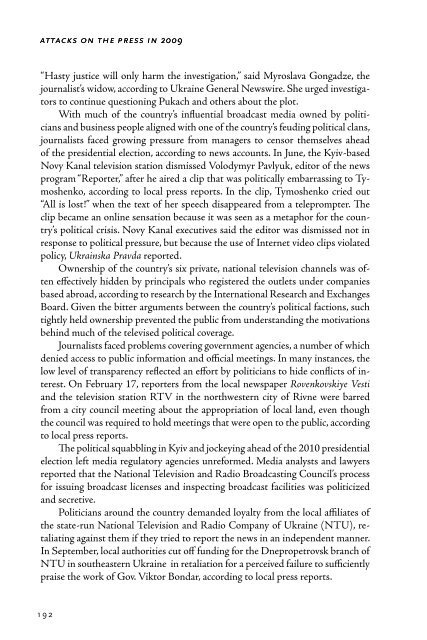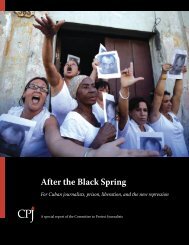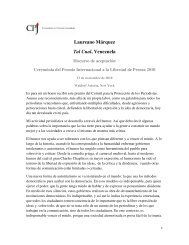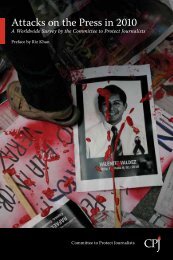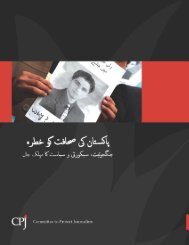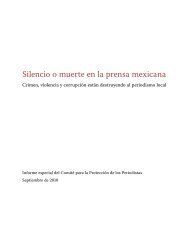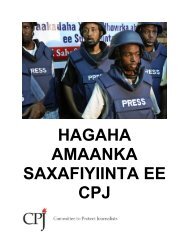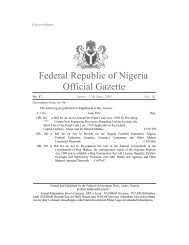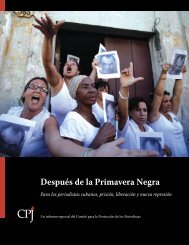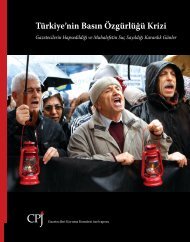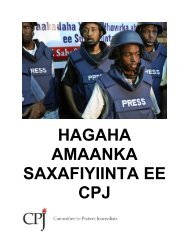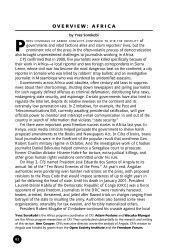Attacks on the Press - Committee to Protect Journalists
Attacks on the Press - Committee to Protect Journalists
Attacks on the Press - Committee to Protect Journalists
- No tags were found...
You also want an ePaper? Increase the reach of your titles
YUMPU automatically turns print PDFs into web optimized ePapers that Google loves.
attacks <strong>on</strong> <strong>the</strong> press in 2009europe and central asia: uzbekistan“Hasty justice will <strong>on</strong>ly harm <strong>the</strong> investigati<strong>on</strong>,” said Myroslava G<strong>on</strong>gadze, <strong>the</strong>journalist’s widow, according <strong>to</strong> Ukraine General Newswire. She urged investiga<strong>to</strong>rs<strong>to</strong> c<strong>on</strong>tinue questi<strong>on</strong>ing Pukach and o<strong>the</strong>rs about <strong>the</strong> plot.With much of <strong>the</strong> country’s influential broadcast media owned by politiciansand business people aligned with <strong>on</strong>e of <strong>the</strong> country’s feuding political clans,journalists faced growing pressure from managers <strong>to</strong> censor <strong>the</strong>mselves aheadof <strong>the</strong> presidential electi<strong>on</strong>, according <strong>to</strong> news accounts. In June, <strong>the</strong> Kyiv-basedNovy Kanal televisi<strong>on</strong> stati<strong>on</strong> dismissed Volodymyr Pavlyuk, edi<strong>to</strong>r of <strong>the</strong> newsprogram “Reporter,” after he aired a clip that was politically embarrassing <strong>to</strong> Tymoshenko,according <strong>to</strong> local press reports. In <strong>the</strong> clip, Tymoshenko cried out“All is lost!” when <strong>the</strong> text of her speech disappeared from a teleprompter. Theclip became an <strong>on</strong>line sensati<strong>on</strong> because it was seen as a metaphor for <strong>the</strong> country’spolitical crisis. Novy Kanal executives said <strong>the</strong> edi<strong>to</strong>r was dismissed not inresp<strong>on</strong>se <strong>to</strong> political pressure, but because <strong>the</strong> use of Internet video clips violatedpolicy, Ukrainska Pravda reported.Ownership of <strong>the</strong> country’s six private, nati<strong>on</strong>al televisi<strong>on</strong> channels was ofteneffectively hidden by principals who registered <strong>the</strong> outlets under companiesbased abroad, according <strong>to</strong> research by <strong>the</strong> Internati<strong>on</strong>al Research and ExchangesBoard. Given <strong>the</strong> bitter arguments between <strong>the</strong> country’s political facti<strong>on</strong>s, suchtightly held ownership prevented <strong>the</strong> public from understanding <strong>the</strong> motivati<strong>on</strong>sbehind much of <strong>the</strong> televised political coverage.<strong>Journalists</strong> faced problems covering government agencies, a number of whichdenied access <strong>to</strong> public informati<strong>on</strong> and official meetings. In many instances, <strong>the</strong>low level of transparency reflected an effort by politicians <strong>to</strong> hide c<strong>on</strong>flicts of interest.On February 17, reporters from <strong>the</strong> local newspaper Rovenkovskiye Vestiand <strong>the</strong> televisi<strong>on</strong> stati<strong>on</strong> RTV in <strong>the</strong> northwestern city of Rivne were barredfrom a city council meeting about <strong>the</strong> appropriati<strong>on</strong> of local land, even though<strong>the</strong> council was required <strong>to</strong> hold meetings that were open <strong>to</strong> <strong>the</strong> public, according<strong>to</strong> local press reports.The political squabbling in Kyiv and jockeying ahead of <strong>the</strong> 2010 presidentialelecti<strong>on</strong> left media regula<strong>to</strong>ry agencies unreformed. Media analysts and lawyersreported that <strong>the</strong> Nati<strong>on</strong>al Televisi<strong>on</strong> and Radio Broadcasting Council’s processfor issuing broadcast licenses and inspecting broadcast facilities was politicizedand secretive.Politicians around <strong>the</strong> country demanded loyalty from <strong>the</strong> local affiliates of<strong>the</strong> state-run Nati<strong>on</strong>al Televisi<strong>on</strong> and Radio Company of Ukraine (NTU), retaliatingagainst <strong>the</strong>m if <strong>the</strong>y tried <strong>to</strong> report <strong>the</strong> news in an independent manner.In September, local authorities cut off funding for <strong>the</strong> Dnepropetrovsk branch ofNTU in sou<strong>the</strong>astern Ukraine in retaliati<strong>on</strong> for a perceived failure <strong>to</strong> sufficientlypraise <strong>the</strong> work of Gov. Vik<strong>to</strong>r B<strong>on</strong>dar, according <strong>to</strong> local press reports.The years of political gridlock in Kyiv exacerbated <strong>the</strong> cultural divisi<strong>on</strong>s between<strong>the</strong> pro-European, Ukrainian-speaking populati<strong>on</strong> in <strong>the</strong> nor<strong>the</strong>rn and westernregi<strong>on</strong>s, and <strong>the</strong> pro-Moscow sympathies of <strong>the</strong> Russian-speaking populati<strong>on</strong> in<strong>the</strong> sou<strong>the</strong>rn and eastern regi<strong>on</strong>s. Political leaders in Moscow exploited <strong>the</strong> tensi<strong>on</strong>by using Russia’s powerful state media <strong>to</strong> flood eastern Ukraine with propagandavilifying pro-Western politicians in Kyiv. Ukrainian authorities resp<strong>on</strong>ded by makingstricter checks of Russian journalists entering <strong>the</strong> country and c<strong>on</strong>ducting closerm<strong>on</strong>i<strong>to</strong>ring of Russian-language televisi<strong>on</strong> rebroadcasting within <strong>the</strong> country.Ukraine’s ec<strong>on</strong>omy, which had been growing rapidly, was hit hard by <strong>the</strong>global recessi<strong>on</strong>. The ec<strong>on</strong>omic free fall led <strong>to</strong> a drop in <strong>the</strong> value of <strong>the</strong> nati<strong>on</strong>alcurrency and layoffs in <strong>the</strong> country’s steel and chemical industries. A significantdrop in advertising raised fears that media pluralism would decline because financialpressures and greater competiti<strong>on</strong> would force more of <strong>the</strong> country’s privatemedia outlets <strong>to</strong> seek government subsidies or come under <strong>the</strong> ownership of <strong>the</strong>country’s dominant political and business clans.UZBEKISTANPresident islam karimov’s authoritarian government heldat least seven journalists in pris<strong>on</strong>, retaining its no<strong>to</strong>rious distincti<strong>on</strong> as <strong>the</strong>regi<strong>on</strong>’s leading jailer of journalists. Authorities harassed independent journalists,blocked critical news Web sites, and retained <strong>the</strong>ir tight grip <strong>on</strong> traditi<strong>on</strong>almedia. Lawyers who defended journalists found <strong>the</strong>mselves <strong>the</strong> targets of stateretaliati<strong>on</strong> as <strong>the</strong> country’s judicial system grew more punitive. While authoritieskept a stranglehold <strong>on</strong> free expressi<strong>on</strong> at home, Uzbek diplomats insistedthat <strong>the</strong>ir country’s acti<strong>on</strong>s were c<strong>on</strong>sistent with democratic principles.Karimov, who rose <strong>to</strong> leadership in Uzbekistan under Soviet rule, markedtwo decades in power in June. While proclaiming himself a democrat after <strong>the</strong>demise of <strong>the</strong> Soviet Uni<strong>on</strong>, his policies have c<strong>on</strong>sistently reflected authoritariantraditi<strong>on</strong>s. His regime has impris<strong>on</strong>ed its critics and forced <strong>the</strong>m in<strong>to</strong> exile,violated human rights, and brought <strong>the</strong> country’s <strong>on</strong>ce-vibrant independent press<strong>to</strong> near extincti<strong>on</strong>.Government figures show more than 1,100 domestic media outlets. Althoughmost are technically independent from <strong>the</strong> state, agents with <strong>the</strong> Uzbek securityservice, known as <strong>the</strong> SNB, censor print and broadcast reports before <strong>the</strong>y reach<strong>the</strong> public, CPJ research shows. In March, SNB representatives held a series ofmeetings with Uzbek edi<strong>to</strong>rs in <strong>the</strong> capital, Tashkent, <strong>to</strong> direct <strong>the</strong>m <strong>to</strong> endorsegovernment polices and <strong>to</strong> avoid critical reporting, <strong>the</strong> independent regi<strong>on</strong>al newsWeb site Voice of Freedom reported.192193


